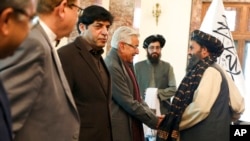Pakistan’s Defense Minister Khawaja Asif says his country does not want to engage in an armed conflict with neighbor Afghanistan after Islamabad conducted airstrikes this week on alleged terrorist hideouts across the border.
“Force is the last resort. We do not want to have an armed conflict with Afghanistan,” Asif said, speaking exclusively to VOA.
However, he warned that Islamabad could block the corridor it provides to landlocked Afghanistan for trade with India, saying Pakistan has the right to stop facilitating Kabul if it fails to curb anti-Pakistan terrorists operating on Afghan soil.
“If Afghanistan treats us like an enemy, then why should we give them a trade corridor?” he said.
On Monday, Pakistan confirmed carrying out “intelligence-based anti-terrorist” operations along the border inside Afghanistan targeting banned terrorist outfit Tehrik-e-Taliban and its affiliates.
The strikes came after insurgents killed seven troops, including two officers, in an attack on a regional military base in Pakistan’s border district of North Waziristan on Saturday.
Pakistan alleges that fighters linked to Tehrik-e-Taliban Pakistan, or TTP, and groups supporting it have a haven in Afghanistan.
Intelligence assessments by the United Nations affirm the TTP presence in Afghanistan and say some ruling Afghan Taliban members have joined its ranks.
“A message needed to be sent that this [cross-border terrorism] has grown too much,” Asif told VOA, adding that Pakistan wanted to convey to the de facto rulers in Kabul “that we cannot continue like this.”
Pakistan has experienced a surge in terror attacks since the Taliban returned to power in Afghanistan in August 2021.
The Afghan Taliban initially brokered talks between Pakistan and TTP, but the latter unilaterally ended a cease-fire in November 2022. Since then, Pakistan has seen a dramatic rise in attacks, primarily against military and security personnel in Khyber Pakhtunkhwa and Balochistan provinces bordering Afghanistan.
An estimated 5,000 to 6,000 TTP fighters are present in Afghanistan. They took refuge across the border after Pakistan conducted massive military operations in Khyber Pakhtunkhwa to flush out terrorists almost a decade ago.
The militant group also provided battlefield support to the Afghan Taliban in their 20-year war against a U.S.-backed government in Kabul.
Asif said that in a visit to Kabul in February 2023, he told Taliban ministers not to let the TTP’s past favors tie Kabul’s hands.
“If they [TTP] have done you a favor and you’re grateful to them, then control them. Don’t let them start a war with us while living in your country, and you become their ally,” he said.
The Taliban denies harboring anti-Pakistan terrorists. Reacting strongly to Monday’s strikes, which Kabul alleged killed eight civilians, Taliban spokesperson Zabihullah Mujahid warned of serious consequences.
“Pakistan should not blame Afghanistan for the lack of control, incompetence and problems in its own territory. Such incidents can have very bad consequences, which will be out of Pakistan's control,” Mujahid said in a statement.
The Taliban Defense Ministry later confirmed that its security forces targeted Pakistani positions with “heavy weapons."
Since Tuesday, a tense calm has prevailed along the 2,600-kilometer-long border (1,616 miles).
Experts say that while the Taliban do not have the military might to attack Pakistan, the Afghan Taliban could use unconventional means, including actively supporting anti-Pakistan militants, to respond if aggression from Islamabad grows.
“If they can harm us, then we’ll be forced to [retaliate],” Asif said, while expressing hope that Afghanistan would meet the “single demand” of reining in TTP, preventing the need for future military strikes from Pakistan.
The defense minister alleged that Kabul was letting TTP operate against Pakistan in a bid to prevent its members from joining the Islamic State terrorist outfit’s local chapter, known as IS-Khorasan Province. Known commonly as IS-KP, the group is a major internal security threat for Afghanistan.
Reacting to Monday’s strikes, the U.S. State Department urged Pakistan and Afghan Taliban to take steps to address differences.
“We urge the Taliban to ensure that terrorist attacks are not launched from Afghan soil, and we urge Pakistan to exercise restraint and ensure civilians are not harmed in their counterterrorism efforts,” deputy spokesperson Vedant Patel told media during a regular press briefing Monday.
Pakistan’s biggest ally, China, has remained silent on the cross-border fighting. Asif dismissed the lack of public support from Beijing.
“It’s not necessary that the world must applaud us. What is in our interest is enough for us. We are protecting our interest, irrespective of whether someone applauds us or not,” Asif said.














